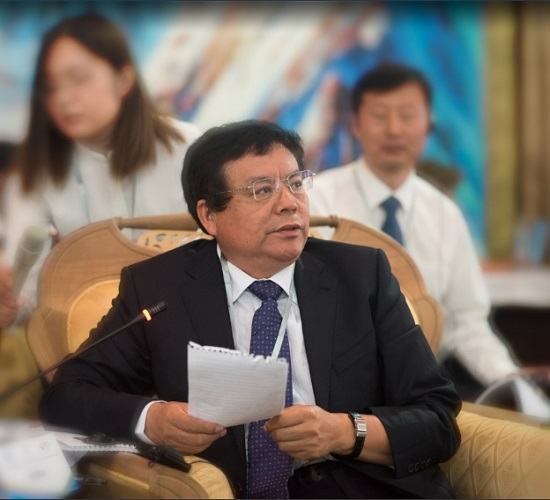Zhao Shucong Pays Visit to Kyrghyzstan and Attends the 2nd MMRF GCA

At the invitation of Director A. Rustamov of the State Agency on Environment Protection and Forestry of the Kyrgyz Republic (SAEPF), Chair of Board of Asia-Pacific Network for Sustainable Forest Management and Rehabilitation (APFNet) Zhao Shucong traveled to Issyk-Kul, Kyrghyzstan to attend the 2nd Meeting of Ministers Responsible for Forestry in Greater Central Asia (MMRF2 GCA), which was hosted by SAEPF and co-organized by APFNet from August 14 to 17. Attending were more than 40 participants including ministers, high-level government officials from China, Kazakhstan, Kyrghyzstan, Mongolia, Tajikistan, Turkmenistan and Uzbekistan.
Zhao Shucong delivered a speech at the opening ceremony and on behalf of APFNet showed gratitude to the Kyrgyzstan side and relevant departments. He expressed that at the 1st meeting in Astana, Kazakhstan, seven economies reached many consensuses and agreed with the “Astana Statement”. Since that many jobs have been done and with joint efforts we’ve made progress on the path towards common prosperity and development of forestry.
At the first and second sessions of the meeting, delegation leaders of 7 economies and APFNet exchanged in-depth views on topics “Enhancing transboundary cooperation to conserve biodiversity and forest ecosystems” as well as “Combating desertification”, reaching broad consensus. Zhao Shucong said that APFNet as a regional international organization recommends all relevant economies coordinate policies, fighting with disaster resistance, working experience and survey of resource. Besides, APFNet also funds forest workers to study in Beijing, Inner Mongolia etc. to improve their abilities on combating desertification.
“You policy makers gather together is already an important outcome, our mutual communication has specific harvest and cooperation among us will make a better future.” Zhao Shucong said.
All participants highly commended the meeting mechanism of Ministers Responsible for Forestry in Greater Central Asia, they expressed their willingness to fully support this work and looked forward to further cooperation.
At the first and second sessions of the meeting, delegation leaders of 7 economies and APFNet exchanged in-depth views on topics “Enhancing transboundary cooperation to conserve biodiversity and forest ecosystems” as well as “Combating desertification”, reaching broad consensus. Zhao Shucong said that APFNet as a regional international organization recommends all relevant economies coordinate policies, fighting with disaster resistance, working experience and survey of resource. Besides, APFNet also funds forest workers to study in Beijing, Inner Mongolia etc. to improve their abilities on combating desertification.
“You policy makers gather together is already an important outcome, our mutual communication has specific harvest and cooperation among us will make a better future.” Zhao Shucong said.
All participants highly commended the meeting mechanism of Ministers Responsible for Forestry in Greater Central Asia, they expressed their willingness to fully support this work and looked forward to further cooperation.



